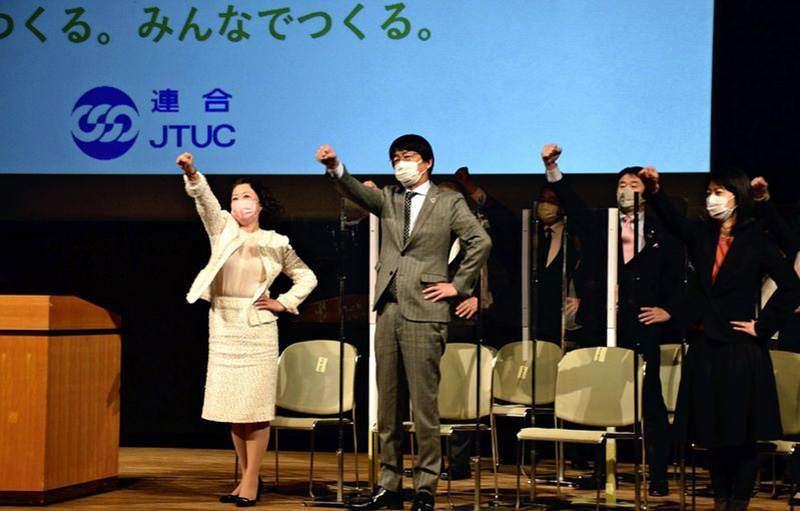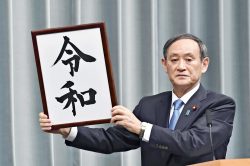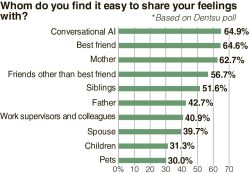
The Japanese Trade Union Confederation’s rally for the 2022 shunto is held in Tokyo on Feb. 3.
11:02 JST, February 14, 2022
There is a growing movement among labor unions to forgo demanding blanket wage hikes in the shunto annual spring labor-management wage negotiations in 2022.
The trend, which could create wage gaps within and between companies, is intended to encourage companies to reflect the performance of their employees in their wages and to elicit flexible responses from the management.
However, there are concerns this would lead to a decline in the bargaining ability of labor unions and an increase in wage gaps.
Moving away from blanket pay hikes will likely have two key aspects. The first is that there will be disparities in wages within companies.
At the end of January, the Toyota Motor Workers’ Union presented its members with the executive board’s proposal for a standard monthly wage increase between ¥1,600 and ¥4,900, with the increases divided into 12 categories according to job types and positions.
The union will no longer demand an average monthly base wage hike.
The Sony Group’s labor union has agreed with management not to negotiate for blanket wage increases starting with the 2022 shunto labor negotiations.
Regarding approximately 3,000 employees at the group’s headquarters, the union will change its demand from a pay hike to a performance-based system. At affiliated companies, the union will continue to negotiate for wage increases based on their positions.
The other key aspect is that labor unions would accept gaps among companies.
The Japanese Electrical Electronic and Information Union, which is made up of labor unions of electrical machinery manufacturers and other companies, has set a unified demand of a monthly pay-scale rise of at least ¥3,000 for base increases in the 2022 shunto negotiations.
However, for the third year in a row, the union plans to accept gaps in the compromise figure among companies because there have been growing differences in the types of operations and business performance of each company.
In 2021, the labor unions all asked for a monthly pay-scale rise of ¥2,000. However, the companies’ responses varied, with Hitachi Ltd. offering ¥1,200, and Panasonic Corp. and Toshiba Corp. offering ¥1,000.
For the fourth year in a row, the Confederation of Japan Automobile Workers’ Unions does not plan to present to management with unified demands for pay scale hikes. It will ask its member labor unions to present their demands according to the actual situations at their companies.
Should more unions drop their calls for blanket pay hikes, their bargaining power could be weakened and the gaps between companies and between individual workers could become wider.
“We were grateful when the superior organization set the target, as it put pressure on the management side,” an official of a labor union said.
A business executive said: “Companies want to reward those who are working hard with higher wages and not raise wages for those who are not. Japanese companies will not be able to sustain themselves if there is misguided equality.”
Changes in the industrial structure have turned the shunto into a mere formality that needs to be changed, said Hisashi Yamada, vice chairman of the Japan Research Institute Ltd.
“The reason why the Toyota union is making its own demands is probably because the conventional way of doing things does not fit the times,” he said.
"Business" POPULAR ARTICLE
-

Japan Govt Adopts Measures to Curb Mega Solar Power Plant Projects Amid Environmental Concerns
-

Core Inflation in Tokyo Slows in December but Stays above BOJ Target
-

Major Japan Firms’ Average Winter Bonus Tops ¥1 Mil.
-

Bank of Japan Considered U.S. Tariffs, Coming Shunto Wage Hike Talks in Its Decision to Raise Interest Rates
-

Institute: 2026 Condo Supply in Tokyo Metropolitan Area Forecast to Increase by 2.2%
JN ACCESS RANKING
-

Japan Govt Adopts Measures to Curb Mega Solar Power Plant Projects Amid Environmental Concerns
-

Core Inflation in Tokyo Slows in December but Stays above BOJ Target
-

Major Japan Firms’ Average Winter Bonus Tops ¥1 Mil.
-

Bank of Japan Considered U.S. Tariffs, Coming Shunto Wage Hike Talks in Its Decision to Raise Interest Rates
-

Tokyo Zoo Wolf Believed to Have Used Vegetation Growing on Wall to Climb, Escape; Animal Living Happily after Recapture




























